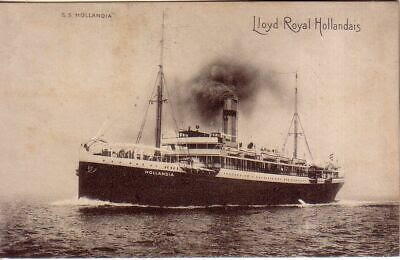Accompanied by Mrs. Lasker, Dr. Lasker arrived on March 7, on the steamship Hollandia, and was met by Dr. Rafael de Pazos, president of the Club de Ajedrez, and many chess enthusiasts, who extended a cordial greeting to the great player who had traveled so far to meet his rival on his own ground.Lasker departed Amsterdam 16 February 1921 directly for Havana on board the Hollandia. He had intended to travel to Cuba via New York, but the US State Department had denied his visa because, "technically a state of war still existed between [the US] and Germany", according to a report in American Chess Bulletin.* The US Secretary of State, Bainbridge Colby, was a chess player and formerly a member of the Manhattan Chess Club. The club president brought the matter to Colby's attention, and Lasker's visa was approved, but too late for Lasker to change his new plans.
Hartwig Cassel
 |
| S.S. Hollandia |
The much anticipated match had been in preparation more than a decade. Capablanca had been mentioned as a possible challenger to Lasker as early as 1908, before the young Cuban had any significant tournament or match experience. Capablanca's decisive victory over Frank Marshall in 1909 brought him international recognition and invitation to a master tournament in San Sebastian, Spain in spring 1911. The event was otherwise limited to masters with a strong record of tournament success. Although some participants raised objections to his inclusion, these were silenced by his first place finish.
Seven months later, Capablanca sent a formal challenge to Lasker for a World Championship Match. Lasker accepted the challenge, and the two began negotiating the details. After several months of letters back and forth, and dispatches by both to the press, negotiations reached an impasse.
There was a chance that negotiations would resume when it appeared that hurt feelings between the two men were soothed when they both participated in the St. Petersburg chess tournament in 1914, but war soon broke out. The First World War disrupted chess activities and international travel, and also had a deleterious impact on Lasker's finances and his mental state. Lasker wrote to Walter Penn Shipley:
In chess I have become a "duffer", though with training I might learn the game anew. I am rather sick of war, famine, revolution, immorality and violence. Not that I despair of the world--not at all--but for the moment I should like to be out of the tempest; because my power of endurance is nearly used up, not physically, but morally.On 23 January 1920, Capablanca and Lasker, meeting at The Hague, concluded an agreement to play a match after 1 January 1921. Readers interested in the details of this agreement and subsequent controversies are referred to Edward Winter's definitive accounts in Capablanca (1989) and Chess Facts and Fables (2006), as well as updates in his Chess Notes.
American Chess Bulletin (November 1919), as rpt. in Winter, A Chess Omnibus
Then, in June 2020, Lasker resigned the championship, making Capablanca the World Champion. In July, Deutsche Schachzeitung carried the headline, "Capablanca, der neue Schachweltmeister", but Deutsches Wochenschach disputed the title the following month (Winter 2006, 144). Capablanca went back to The Hague in August and a new agreement was worked out with Lasker, who maintained that he was now the challenger.
Finally, in December, Lasker confirmed that he would travel to Cuba for a match to begin 10 March.
It is my intention to follow this match as it took place, posting updates on the centennial of their occurrence. The first game is scheduled for 15 March, due to Lasker's delayed arrival.
Sources
Capablanca,José Raúl. World's Championship Matches, 1921 and 1927. New York: Dover, 1977.
Cassel, Hartwig. "Arrival of Dr. Lasker in Cuba." American Chess Bulletin 18, no. 3 (March 1921), 47-48.
"The Championship Match at Havana." American Chess Bulletin 18, no. 2 (February 1921), 21.
Linder, Isaak, and Vladimir Linder. José Raúl Capablanca: 3rd World Chess Champion, trans. Boris Belitsky. The World Champion Series. Milford, CT: Russell Enterprises, 2010.
Waxman, Matthew. "When Did World War I End?" Lawfare (11 November 2018). https://www.lawfareblog.com/when-did-world-war-i-end.
Winter, Edward. Capablanca: A Compendium of Games, Notes, Articles, Correspondence, Illustrations and Other Rare Archival Materials on the Cuban Chess Genius Jose Raul Capablanca, 1888-1942. Jefferson, NC: McFarland, 1989.
_______. A Chess Omnibus. Milford, CT: Russell Enterprises, 2003._______. Chess Facts and Fables. Jefferson, NC: McFarland, 2006.
*President Warren G. Harding signed on 3 March 1921, "Joint Resolution Declaring that certain Acts of Congress, joint resolutions, and proclamations shall be construed as if the war had ended and the present or existing emergency expired" (see Waxman).
*President Warren G. Harding signed on 3 March 1921, "Joint Resolution Declaring that certain Acts of Congress, joint resolutions, and proclamations shall be construed as if the war had ended and the present or existing emergency expired" (see Waxman).











Love the chess history! You'll probably see it but I'll point it out anyway, a typo in "June, 2020".
ReplyDeleteThanks. Corrected now.
DeleteThanks for the topical article(s) on this centennial anniversary of the match between the two greatest players between Steinitz and Botvinnik.
ReplyDelete